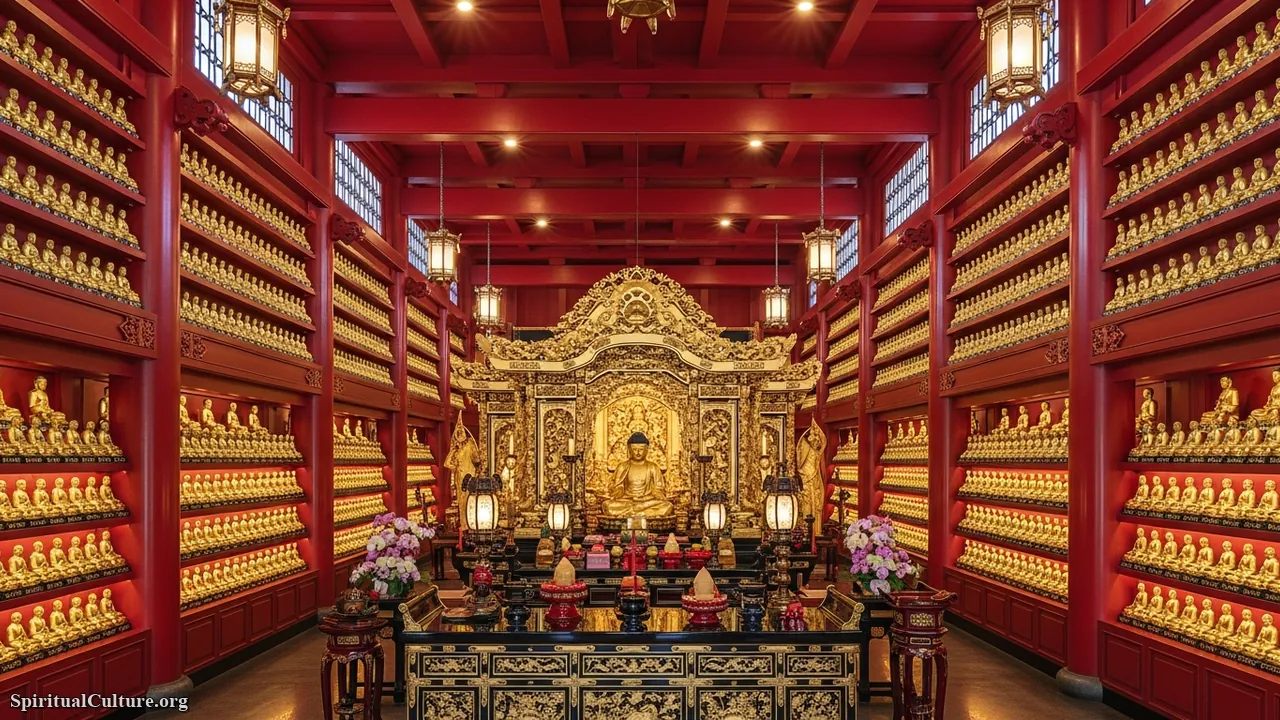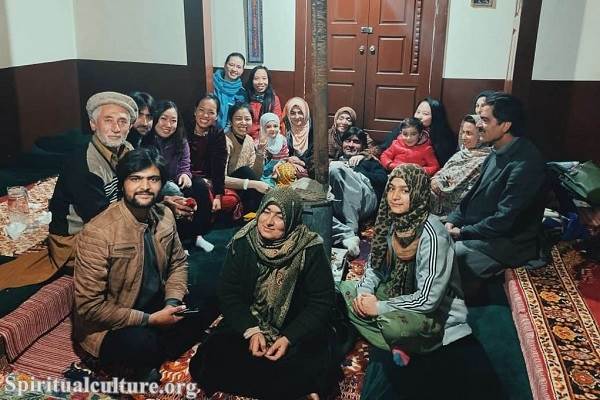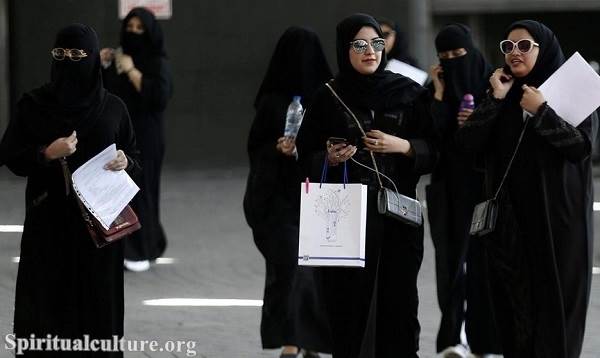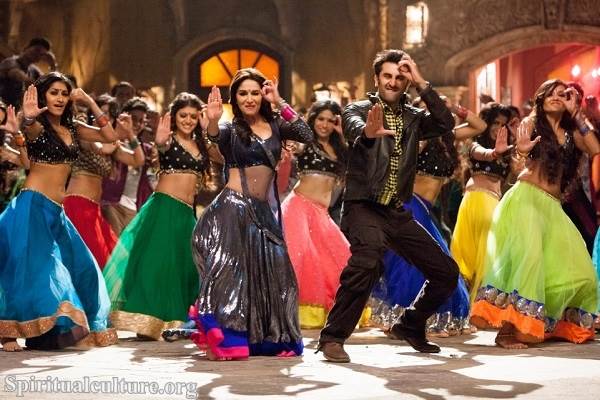The United Arab Emirates (UAE) stands as a dynamic cultural crossroad, where deep-rooted Islamic traditions and Bedouin heritage blend seamlessly with modern global influences. The nation’s most celebrated festivals are far more than mere events; they are profound expressions of spiritual devotion, national identity, and community cohesion. For Spiritual Culture, the true significance of these gatherings lies not just in their scale, but in the values they perpetuate—charity, unity, reflection, and honoring history.
While global mega-events like the Dubai Shopping Festival capture international attention, the core of the UAE’s celebratory calendar remains anchored in two distinct pillars: the Islamic holidays, which are centered on faith and communal worship, and the national/heritage festivals, which reinforce the nation’s unique story and rapid unification. These events shape the social and spiritual rhythm of life for both Emiratis and the large expatriate community.
This guide ranks the ten most influential festivals based on their spiritual depth, historical significance, national impact, and ability to foster genuine cultural exchange as of the Current Time of Writing. Each festival offers a unique lens through which to appreciate the soul of the Emirates, demonstrating how a nation built on tradition embraces the future.
Table of the Top 10 UAE Festivals with the Deepest Spiritual and Cultural Impact
| Rank | Festival Name | Primary Focus | Spiritual/Cultural Significance | Scope/Frequency |
|---|---|---|---|---|
| 1 | Eid al-Fitr | Religious (Islam) | Joyous celebration marking the end of Ramadan; emphasis on charity (Zakat al-Fitr) and family unity. | National Public Holiday (Varies by moon sighting) |
| 2 | Ramadan (The Holy Month) | Religious (Islam) | Month-long period of fasting, self-control, reflection, and increased worship; deep spiritual renewal and community service. | National Observance (Varies by lunar calendar) |
| 3 | UAE National Day (Union Day) | National/Patriotic | Commemorates the 1971 unification of the seven Emirates; cornerstone of modern national identity and pride. | Annual Public Holiday (December 2) |
| 4 | Eid al-Adha | Religious (Islam) | Festival of Sacrifice; honors Prophet Ibrahim’s (Abraham’s) devotion; tied to the Hajj pilgrimage and ritual sharing of meat (Qurbani). | National Public Holiday (Varies by moon sighting) |
| 5 | Sheikh Zayed Heritage Festival | Heritage/Culture | Celebrates the legacy of the founding father, Sheikh Zayed, and preserves traditional Bedouin and Emirati arts, crafts, and customs. | Annual (Late Autumn/Winter) |
| 6 | Al Dhafra Festival | Heritage/Bedouin | The ultimate celebration of authentic desert life, featuring the prestigious camel beauty pageant (Mazayna) and traditional skills like falconry. | Annual (Winter, Al Dhafra Region) |
| 7 | Commemoration Day (Martyrs’ Day) | National/Remembrance | A solemn day of national remembrance honoring Emirati martyrs who sacrificed their lives for the nation. | Annual Public Holiday (December 1) |
| 8 | Islamic New Year (Al-Hijra) | Religious (Islam) | Marks the start of the Hijri lunar calendar, commemorating the Prophet Muhammad’s migration (Hijra); a time for quiet reflection. | National Public Holiday (Varies by lunar calendar) |
| 9 | Global Village | Cultural/Multicultural | A massive outdoor cultural park promoting global cultural exchange, trade, and tolerance by showcasing pavilions from over 90 countries. | Annual (October – April) |
| 10 | Liwa Date Festival | Agricultural/Heritage | Celebrates the date palm, a sacred and historically vital element of Emirati life, focusing on preservation and agricultural excellence. | Annual (Summer, Liwa Oasis) |
#10. Liwa Date Festival
The Liwa Date Festival, held annually in the historic Liwa Oasis in the Al Dhafra region, is a deeply rooted celebration of the date palm, a tree often called the “Mother of the Gulf.” As of the Current Time of Writing, this festival highlights the crucial role this drought-resistant crop played in the sustenance and culture of the region’s early inhabitants. Far from a simple food fair, the event is an agricultural competition focusing on the quality, variety, and cultivation techniques of dates, drawing experts and farmers from across the Gulf region to compete for prestigious awards.
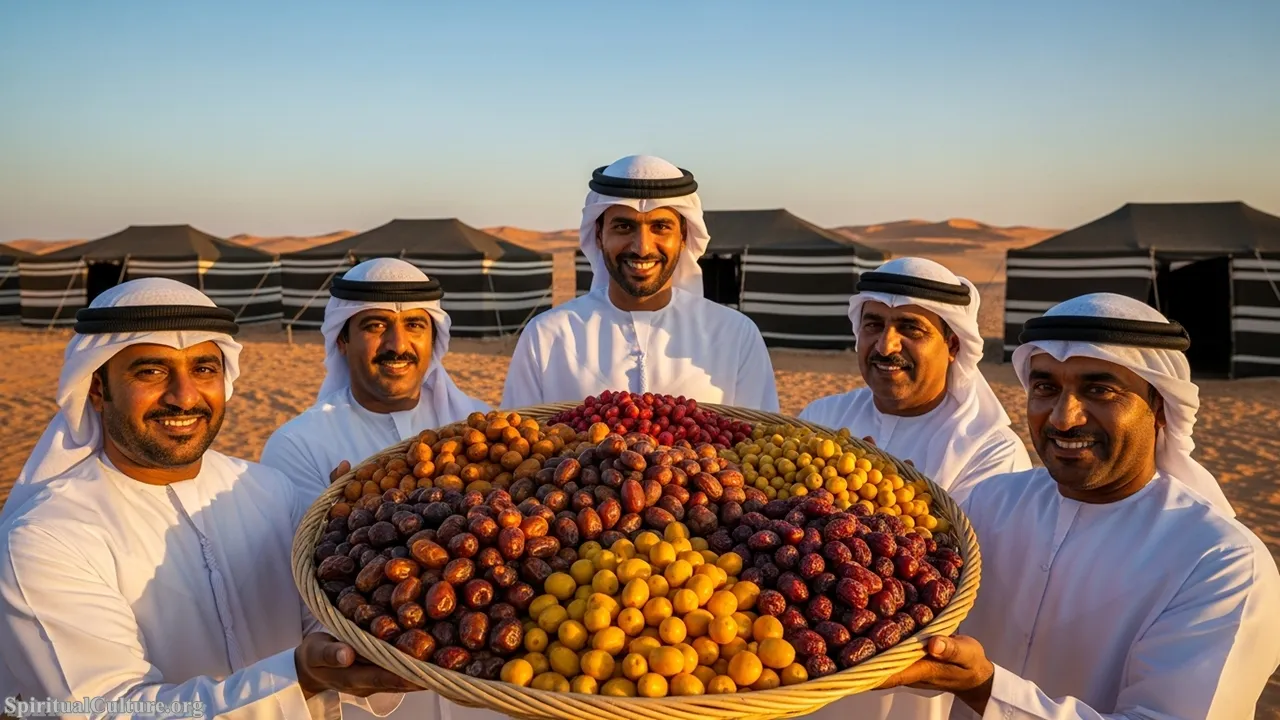
Its spiritual impact is tied directly to the land and the concept of sustenance—the date palm is mentioned in the Holy Quran over 20 times, emphasizing its blessed status as a source of nourishment and life in a harsh desert environment. The festival is a communal act of gratitude (shukr) for the gifts of the earth, reinforcing traditional farming knowledge and the profound connection between the Emirati people and their ancestral desert landscape. It honors the resilience and wisdom of the Bedouin who mastered the art of survival in the oasis.
The moral lesson of the Liwa Date Festival is one of deep respect for resources and the preservation of irreplaceable agricultural heritage. In an era dominated by modern commerce, dedicating an entire festival to a single fruit underscores the enduring value of traditional life and the importance of sustainability. Spiritual Culture celebrates this event as a vital link between the past and present, ensuring the transmission of ancestral knowledge to a new generation.
Cultural/Spiritual Highlights
- The Blessed Tree: Celebrates the date palm, a central symbol of life and sustenance in Islam and Arabian culture.
- Agricultural Heritage: Features competitions for date quality (Mazayna) and traditional methods of palm cultivation.
- Oasis Connection: Reinforces the deep historical and cultural link to the Liwa Oasis, the birthplace of the ruling families.
#9. Global Village
Operating as a large-scale, annual seasonal attraction, Global Village in Dubai is one of the world’s most significant platforms for international cultural exchange, featuring dozens of pavilions representing nations from every continent. As of the Current Time of Writing, it serves as a tangible manifestation of the UAE’s policy of tolerance and openness, hosting millions of visitors who can literally shop, eat, and experience the traditions of the world in one destination. While commercial, its sheer scale of multicultural representation makes it an undeniable cultural force.
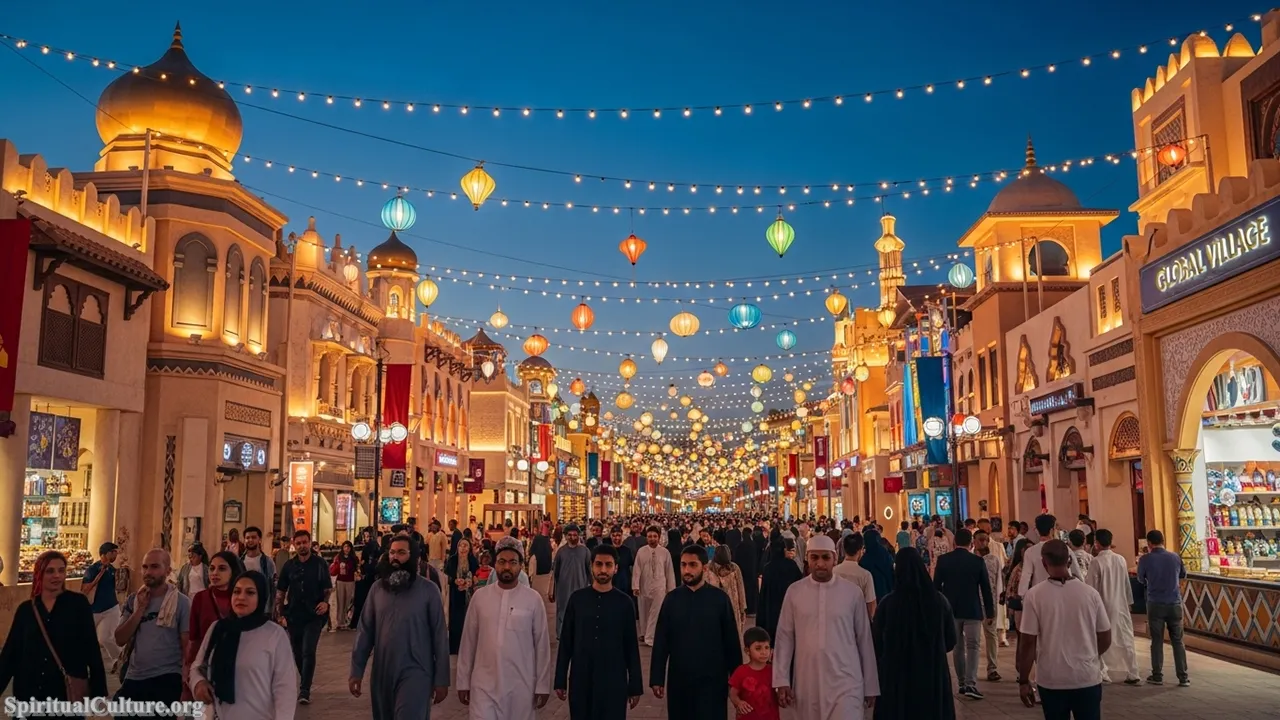
The spiritual dimension of the Global Village is rooted in the celebration of diversity and human unity—a core tenet of humanistic spirituality. By bringing together people, goods, and performances from over 90 countries, it fosters mutual understanding and breaks down societal barriers, aligning perfectly with the UAE’s declared Year of Tolerance initiatives. It is a vibrant, real-world example of Ummah (the global community), encouraging respect for all faiths and traditions through peaceful and joyful commerce and entertainment.
The preservation value of the Global Village lies in its curated showcasing of authentic global crafts, cuisine, and performing arts that might otherwise be overlooked in a globalized world. It acts as a massive temporary museum, teaching visitors, particularly children, about the interconnectedness of human culture. Spiritual Culture sees the event as a celebration of the human spirit’s boundless creativity and its capacity for peaceful coexistence.
Cultural/Spiritual Highlights
- Global Unity: Showcases over 90 countries, embodying the UAE’s commitment to cultural tolerance and exchange.
- World Heritage Showcase: Promotes the survival of global traditional crafts and performing arts.
- Peaceful Commerce: A model for constructive, respectful interaction between diverse global communities.
#8. Islamic New Year (Al-Hijra)
The Islamic New Year, or Al-Hijra, marks the beginning of the new year in the Islamic lunar calendar, falling on the first day of Muharram. As of the Current Time of Writing, this public holiday is a relatively quiet and contemplative observance in the UAE compared to the Eid celebrations, reflecting its profound historical significance rather than exuberant celebration. It is a day dedicated to spiritual reflection and honoring the past without the fireworks and public festivities associated with the Gregorian New Year.

The entire spiritual impact of Al-Hijra is derived from the event it commemorates: the Hijra, or the Prophet Muhammad’s migration from Mecca to Medina in 622 CE. This journey was a pivotal moment in Islamic history, symbolizing the transition from persecution to the establishment of the first Muslim community (Ummah). Observing the day is an act of spiritual pilgrimage, encouraging Muslims to reflect on themes of sacrifice, resilience, and the importance of beginning anew in their faith and moral conduct.
The reflection offered by Al-Hijra is a moral lesson in perseverance and faith under duress. It teaches that true strength comes from spiritual commitment and the willingness to leave behind comfort for the sake of higher purpose. For the UAE, commemorating Al-Hijra reinforces the foundational principles of its dominant faith, providing a necessary counterbalance of quiet, profound introspection in an otherwise fast-paced modern nation, a value deeply cherished by Spiritual Culture.
Cultural/Spiritual Highlights
- The Hijra: Commemorates the Prophet Muhammad’s migration (622 CE), the foundation of the Islamic calendar.
- Quiet Reflection: A solemn, contemplative public holiday focused on prayer and introspection rather than celebration.
- Spiritual Renewal: Encourages Muslims to reset their spiritual goals and reflect on the early community’s sacrifices.
#7. Commemoration Day (Martyrs’ Day)
Commemoration Day, observed annually on December 1st, is a solemn occasion dedicated to honoring the Emirati soldiers and civilians who have sacrificed their lives in the service of the nation and its humanitarian efforts. Instituted in 2015, this day has rapidly become a significant touchstone for national pride and collective remembrance. As of the Current Time of Writing, it is a unified act of respect across all seven Emirates, marked by a minute of silence and flag-raising ceremonies.
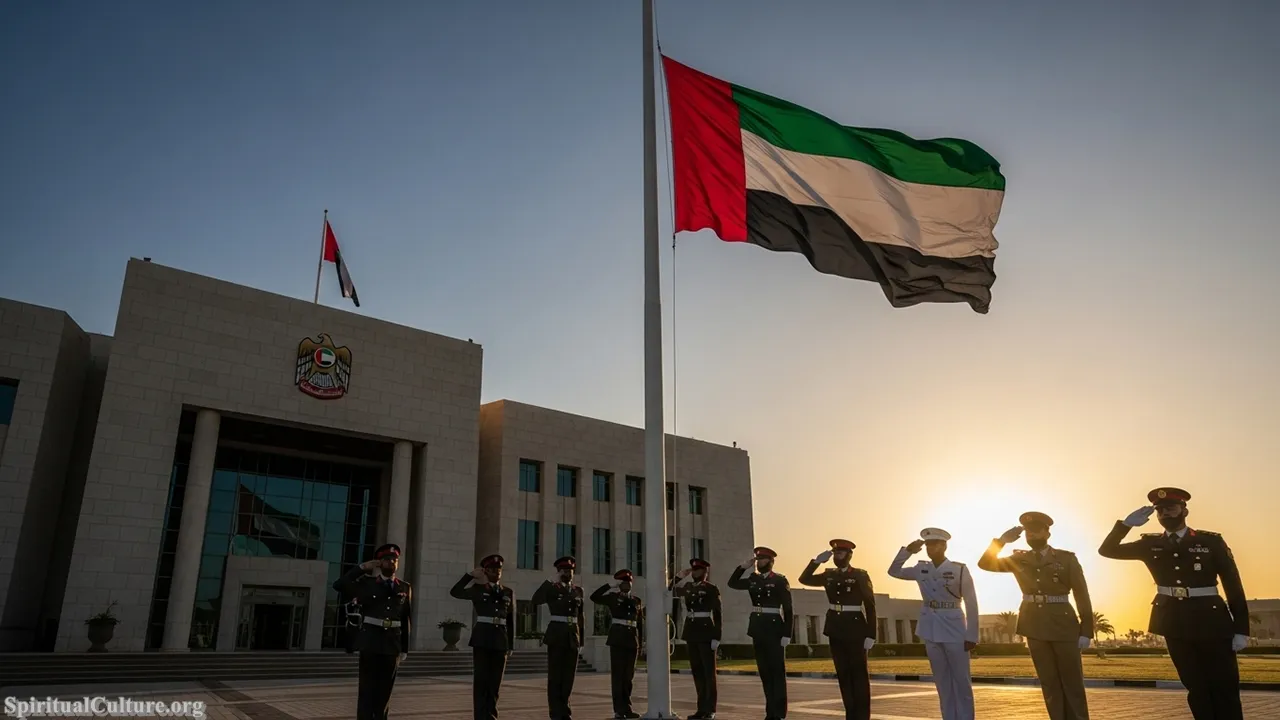
The spiritual impact of this day is immense, centering on the Islamic concept of shahada (martyrdom) and sacrifice (tadhiya). It is a national acknowledgment of the ultimate devotion—giving one’s life for the defense of the nation and its people. The act of shared remembrance transcends political boundaries, strengthening the spiritual and emotional bond between the populace and the leadership, invoking deep feelings of gratitude and patriotism rooted in valor and service.
Commemoration Day provides a vital moral lesson in civic duty, sacrifice, and the value of a cohesive community. By honoring those who came before, the nation reaffirms its commitment to the safety and well-being of its citizens. Spiritual Culture recognizes this day as a powerful celebration of national soul, reinforcing the principle that a great nation is built not just on wealth, but on the sacrifices and moral courage of its people.
Cultural/Spiritual Highlights
- National Sacrifice: Honors Emirati soldiers and civilians who died in service, aligning with the Islamic concept of shahada.
- Unity in Remembrance: A nationwide moment of silence and ceremonies fostering collective national gratitude.
- Civic Devotion: Reinforces the values of patriotism, duty, and service to the country.
#6. Al Dhafra Festival
The Al Dhafra Festival, held in the Al Dhafra region of Abu Dhabi, is arguably the most authentic and traditional Emirati heritage festival, acting as a crucial annual gathering point for the preservation of Bedouin culture. As of the Current Time of Writing, it is primarily known for the competitive camel beauty pageant (Mazayna), which draws the finest camels and breeders from across the Gulf. Beyond the pageant, the festival showcases traditional handicrafts, falconry, purebred Arabian horse races, and poetry competitions.

Its spiritual significance is entirely rooted in the ancient connection between the Bedouin and the desert ecosystem. The camel, the Arabian horse, and the falcon are revered animals essential to the survival and nobility of the ancestral nomadic lifestyle. Celebrating these creatures and the skills needed to master them is a tribute to the resourcefulness and spiritual resilience of the ancestors. The festival is a physical, living embodiment of the heritage that shaped the ethical and cultural framework of the UAE.
The preservation value of Al Dhafra is its role as a cultural incubator, ensuring that crucial aspects of desert lore, dialect, and traditional knowledge remain relevant in the 21st century. It teaches the importance of environmental harmony, respecting the desert’s harsh environment, and upholding the Bedouin codes of hospitality and honor. Spiritual Culture champions this festival for its dedication to keeping the soul of the desert alive.
Cultural/Spiritual Highlights
- Bedouin Authenticity: The central hub for preserving traditional Emirati/Bedouin culture, arts, and desert skills.
- Camel Mazayna: The world’s premier camel beauty pageant, highlighting the sacred status of the animal in Arab culture.
- Ancestral Wisdom: Preserves traditional crafts, poetry, and practices vital to the national heritage identity.
#5. Sheikh Zayed Heritage Festival
Named in honor of the nation’s Founding Father, Sheikh Zayed bin Sultan Al Nahyan, this extensive annual festival in Abu Dhabi is a massive celebration of Emirati heritage, culture, and the importance of global tolerance. As of the Current Time of Writing, it features a vast heritage village, international cultural pavilions, traditional performances, and exhibitions demonstrating the UAE’s historical journey from a federation of tribes to a global power. The festival is a direct, vibrant tribute to Sheikh Zayed’s vision.
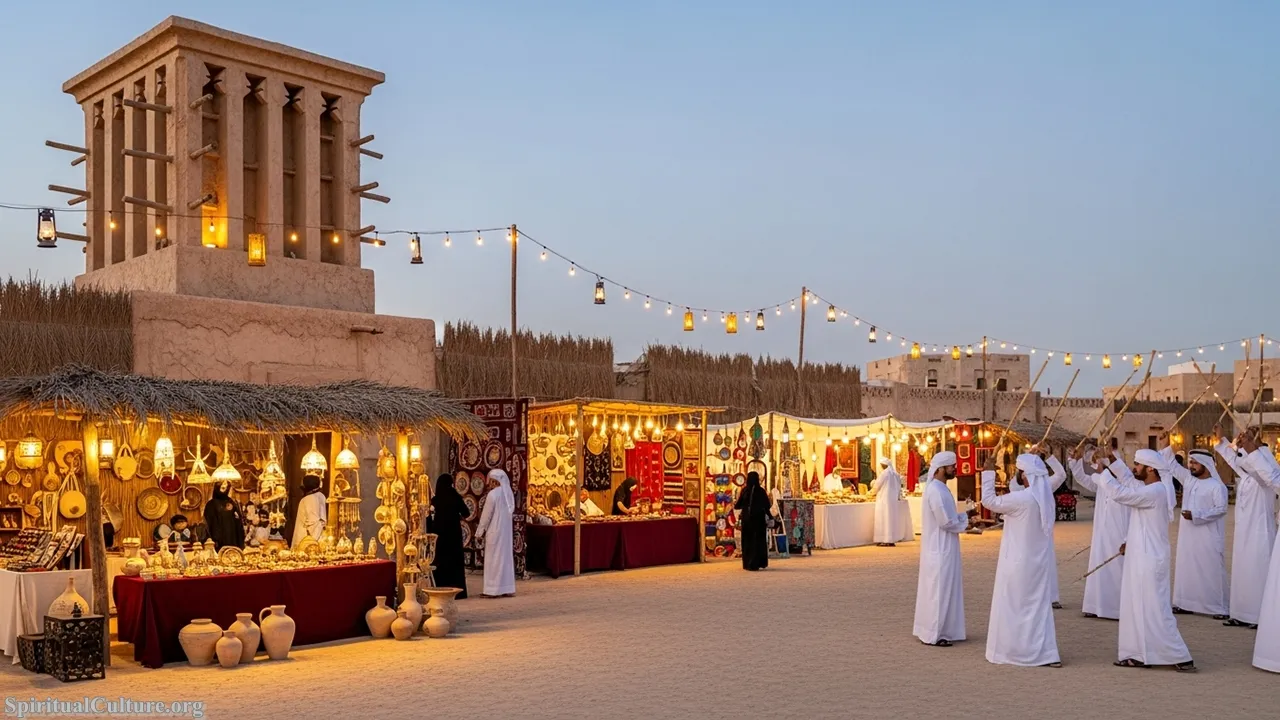
The spiritual impact is dual: firstly, it honors the legacy of Sheikh Zayed, whose vision of national unity, conservation, and tolerance is imbued with profound spiritual and humanistic values. Secondly, the festival acts as an educational platform, actively cultivating national identity and teaching younger generations about the simplicity and hard work of their forefathers. It reinforces the spiritual lesson that true leadership is founded on compassion, wisdom, and a commitment to people and nature, reflecting the belief that charity and unity are forms of worship.
The sheer scope of cultural and historical preservation efforts makes this festival essential. By recreating historical environments and hosting cultural exchanges, it actively preserves traditional crafts, music, and the oral histories that define the UAE. Spiritual Culture sees the Sheikh Zayed Heritage Festival as a dynamic national narrative, affirming that the past is the blueprint for a morally upright future.
Cultural/Spiritual Highlights
- Founding Father’s Legacy: Directly honors Sheikh Zayed’s vision of unity, heritage, and environmental care.
- Historical Education: Uses living history and exhibits to educate youth on the nation’s pre-oil era and history.
- National Identity: A primary event for reinforcing collective Emirati identity and traditional values.
#4. Eid al-Adha
Eid al-Adha, the “Festival of Sacrifice,” is one of the two most significant Islamic holidays globally and in the UAE, observed shortly after the annual Hajj pilgrimage. As of the Current Time of Writing, this festival is a major public holiday marked by communal morning prayers, family feasts, and the ritual sacrifice (Qurbani) of livestock, with the meat traditionally divided into three parts: family, friends, and the poor. It holds an equal, though different, weight to Eid al-Fitr, emphasizing devotion and generosity.
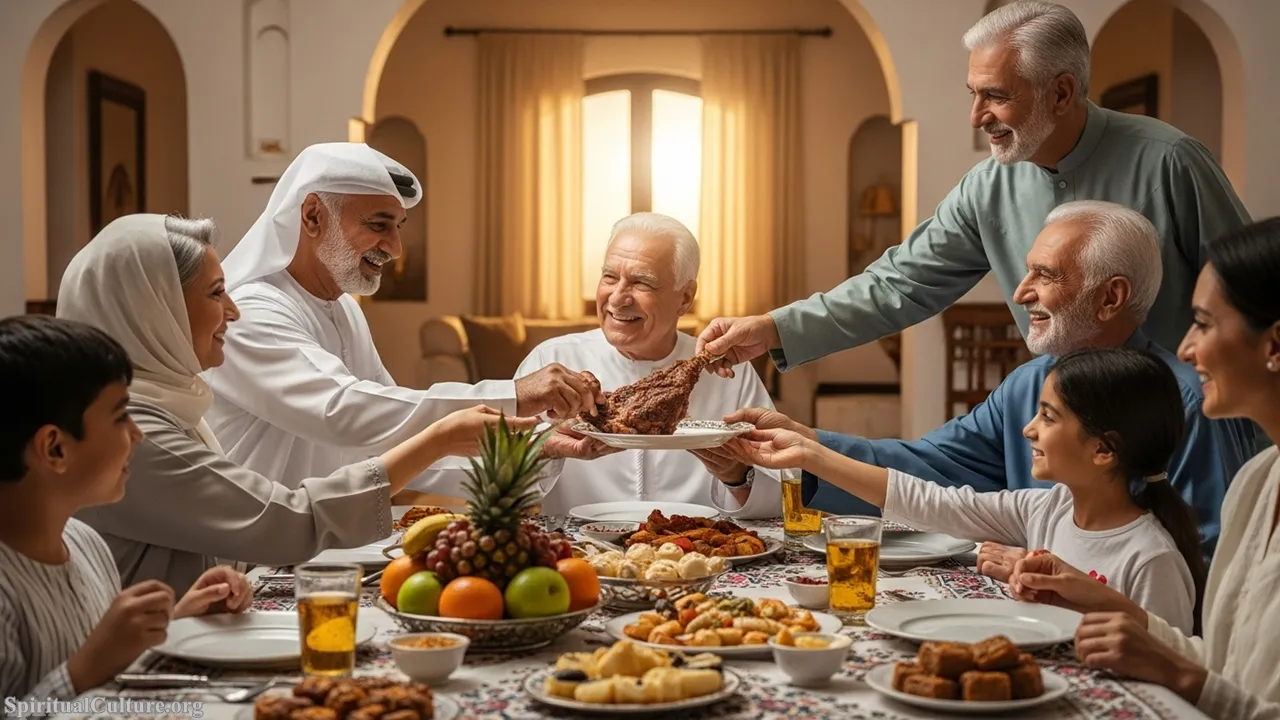
The spiritual core of Eid al-Adha lies in commemorating Prophet Ibrahim’s (Abraham’s) ultimate act of obedience and willingness to sacrifice his son (Ismail in the Islamic tradition) to God. The act of sacrifice and the subsequent sharing of meat is a powerful spiritual lesson in faith, submission (Islam), and selfless charity. For the UAE community, it is a vital practice that reinforces humility, compassion for the less fortunate, and the sacred obligation to help the needy, linking the community directly to the global Muslim Ummah through the Hajj pilgrimage.
The preservation value is in its continuous practice of charity (sadaqah) and community bonds. The moral lesson is that true wealth is measured by one’s generosity and faith, not material possessions. Spiritual Culture views Eid al-Adha as a profound expression of communal faith, teaching that devotion requires tangible acts of kindness and sacrifice for the well-being of others.
Cultural/Spiritual Highlights
- Festival of Sacrifice: Commemorates Prophet Ibrahim’s faith and obedience to God.
- Qurbani Ritual: The practice of sacrificing and sharing meat reinforces charity, humility, and compassion.
- Hajj Link: Directly connected to the annual Hajj pilgrimage, linking the UAE to the global Muslim community.
#3. UAE National Day (Union Day)
Celebrated annually on December 2nd, UAE National Day commemorates the unification of the six Emirates (with Ras Al Khaimah joining soon after) in 1971, marking the founding of the modern nation. As of the Current Time of Writing, it is the single most important national celebration, marked by spectacular fireworks, air shows, grand parades, and nationwide cultural events that see landmarks draped in the national flag. It is a unifying force for Emiratis and residents alike.

The spiritual dimension of National Day is centered on the deeply held concept of ittihad (unity) and the miraculous achievement of the Founding Fathers. It is a celebration of a national covenant—the spiritual commitment of the Rulers to their people and to the vision of a shared, prosperous future. The day cultivates a profound, almost sacred, sense of national identity, pride, and gratitude for the decades of peace and prosperity achieved since the federation’s inception, invoking the blessing of God (Baraka) upon the nation.
The lesson embodied by National Day is the moral strength found in unity, a principle that transcends political science. It teaches that diverse communities can come together to achieve a common, greater good. For Spiritual Culture, this festival is the annual reaffirmation of the UAE’s collective soul, a public outpouring of national gratitude that reinforces the social and political fabric of the federation.
Cultural/Spiritual Highlights
- The Unification: Celebrates the foundational act of national unity in 1971, a source of collective spiritual pride.
- National Covenant: Reinforces the bond between the Rulers and the people based on mutual prosperity and security.
- Patriotic Devotion: Marked by immense public displays of national flag-waving, parades, and cultural performances.
#2. Ramadan (The Holy Month)
Ramadan is the ninth and holiest month in the Islamic calendar, a period of strict dawn-to-dusk fasting, increased prayer, and deep spiritual reflection observed by Muslims worldwide. In the UAE, as of the Current Time of Writing, the entire social and commercial landscape shifts to accommodate this sacred observance; public life slows, working hours are reduced, and the focus shifts almost entirely to spiritual growth and communal service. The month culminates with the grand celebration of Eid al-Fitr.
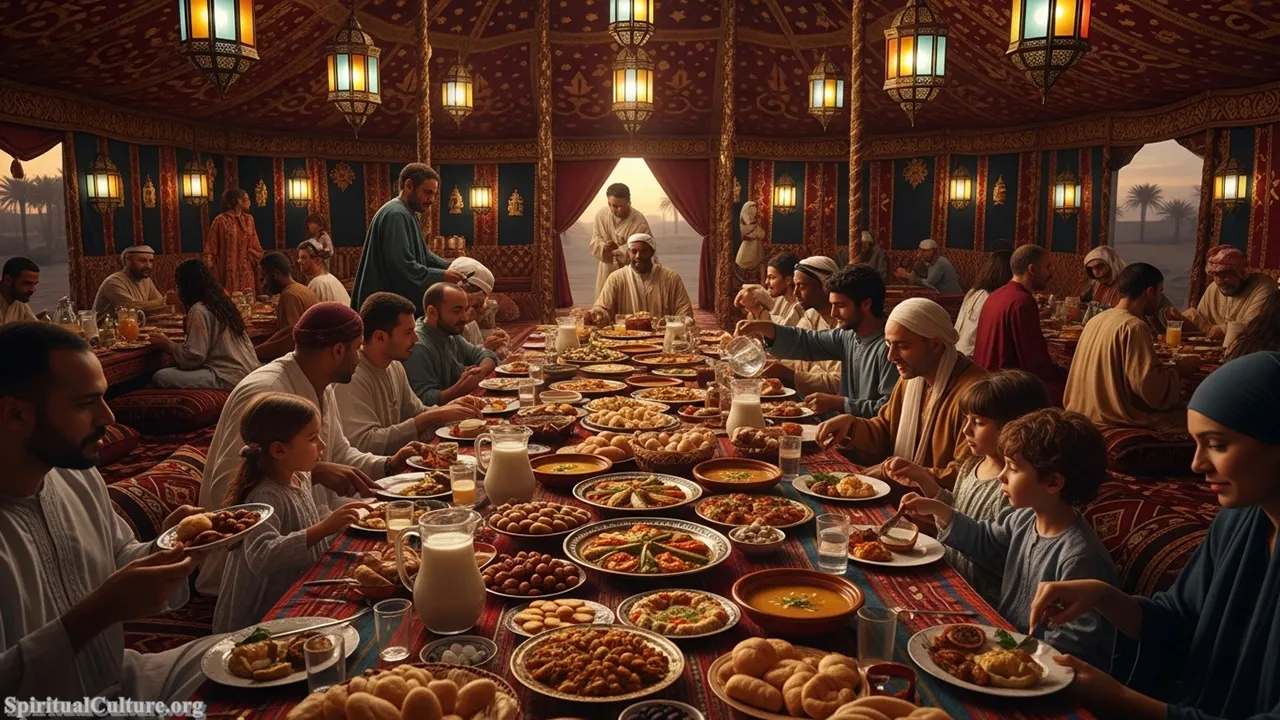
The spiritual impact is unparalleled: Ramadan is the ultimate exercise in self-discipline (tazkiyah an-nafs), empathy, and devotion. By abstaining from food, drink, and other physical comforts, Muslims seek to purify the soul, practice patience (sabr), and intensify their connection with God (Allah). The nightly communal breaking of the fast (Iftar) and the late-night prayers (Tarawih) transform the country into a continuous cycle of worship, community bonding, and extensive charitable giving (Zakat and Sadaqah).
Ramadan’s moral lesson is the profound importance of charity and compassion for the poor, who experience hunger daily. The long days of fasting lead directly to the community spirit of sharing during the Iftar tents and meals, showcasing the UAE’s renowned hospitality and generosity. Spiritual Culture views Ramadan as the essential annual reboot for the nation’s spiritual and moral compass, making it the most significant religious observance on the calendar.
Cultural/Spiritual Highlights
- Spiritual Purification: Month-long fasting and intensive prayer (Tarawih) focused on purifying the soul.
- Community Iftar: Nightly communal breaking of the fast, a massive expression of hospitality and unity.
- Charity Mandate: Increased charitable giving (Zakat) and empathy for the less fortunate.
#1. Eid al-Fitr
Eid al-Fitr, meaning the “Festival of Breaking the Fast,” is the joyous conclusion to the Holy Month of Ramadan and is, without question, the most universally celebrated and spiritually unifying festival in the UAE. Following the sighting of the new crescent moon, the three-day public holiday begins with special communal morning prayers (Salat al-Eid), followed by visiting family, exchanging gifts (especially to children, known as Eidiya), and sharing grand feasts. As of the Current Time of Writing, the air is thick with palpable happiness and the sound of community celebration.
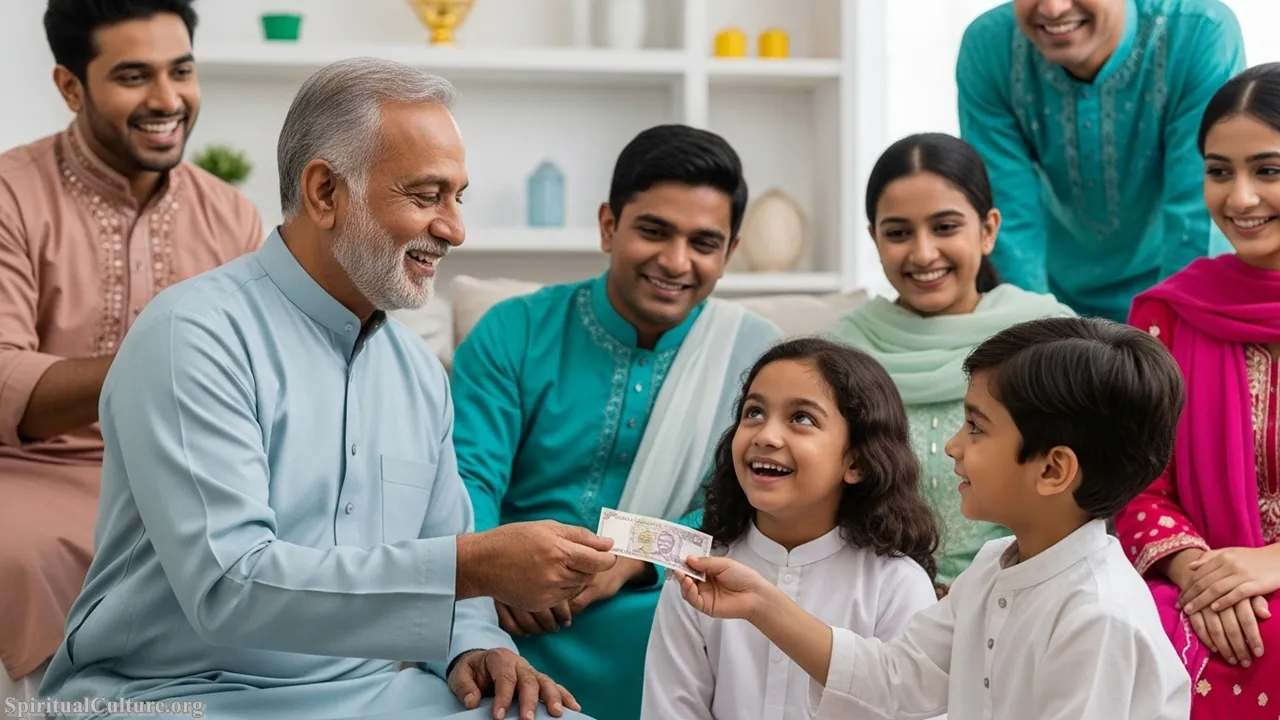
Its spiritual impact is the culmination of a month of intense devotion. It is a reward and a celebration of spiritual success, an opportunity to express profound gratitude to God for the strength to complete the fast. Crucially, the mandatory act of giving to the needy (Zakat al-Fitr) before the Eid prayer ensures that every person can partake in the happiness, solidifying the festival’s deep spiritual connection to social justice and universal community welfare. It is a pure celebration of rebirth and communal belonging.
Eid al-Fitr’s reflection centers on forgiveness, gratitude, and the reinforcement of family and social bonds. It teaches that spiritual discipline leads to tangible joy and communal harmony. By blending intense devotion with open-hearted celebration and mandated charity, the festival embodies the core humanistic and religious values of the Emirates. For Spiritual Culture, Eid al-Fitr is the ultimate expression of the nation’s heart, uniting faith, family, and community in a single, magnificent event.
Cultural/Spiritual Highlights
- End of Fast: Joyous celebration and spiritual reward for completing the disciplined fast of Ramadan.
- Mandatory Charity: The required giving of Zakat al-Fitr ensures universal participation in the holiday’s joy.
- Family and Forgiveness: Primary focus on family visits, reconciliation, and the exchange of gifts (Eidiya).
Conclusion
The festivals and observances celebrated in the UAE—from the deep faith of Eid al-Fitr and the reflection of Ramadan, to the unifying pride of National Day and the authentic heritage of Al Dhafra—collectively weave the magnificent tapestry of Emirati culture. These top ten events serve as powerful, recurring reminders that despite the nation’s rapid modernization and global connectivity, its heart remains firmly anchored in its spiritual and ancestral values. The way the UAE honors both its faith and its founders provides a compelling model of how a society can embrace the future without abandoning the wisdom of the past.
At Spiritual Culture, we find that the most profound lesson offered by these celebrations is the spirit of collective unity and unparalleled generosity that permeates them. Whether through the mass communal meals during Iftar or the solemn acts of remembrance on Commemoration Day, the focus is always on cohesion and compassion. The UAE’s celebratory calendar is not merely a schedule of public holidays; it is a vital, living constitution of its people’s highest moral aspirations, demonstrating that the soul of a nation thrives when heritage and humanity are celebrated together.
